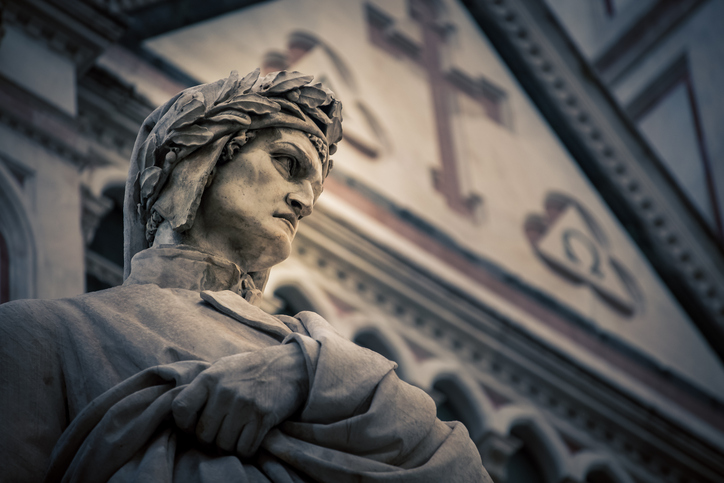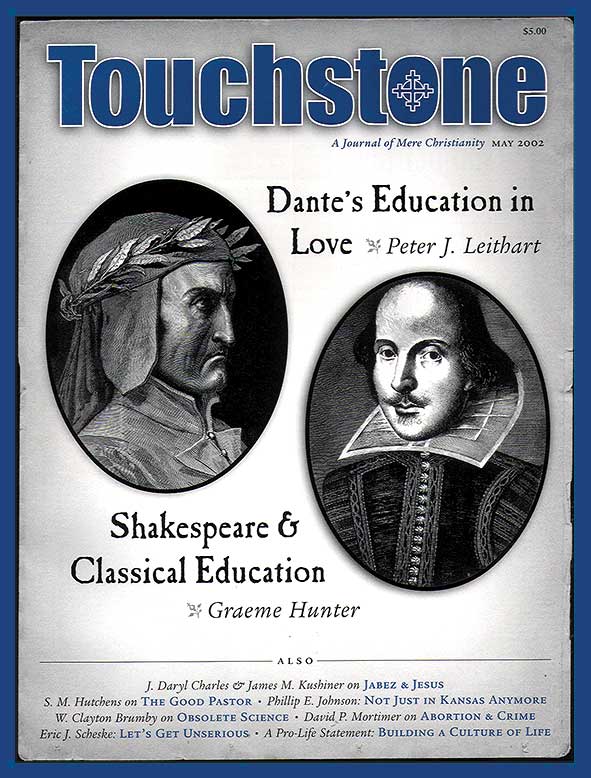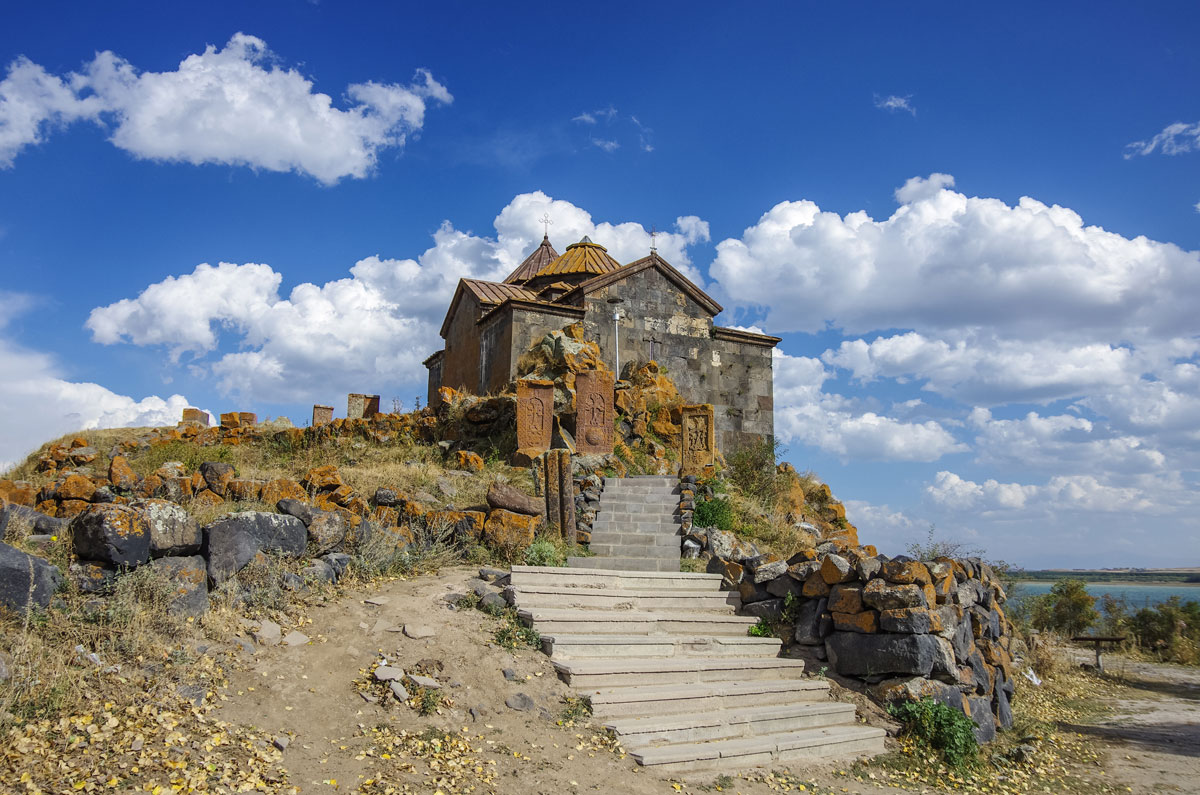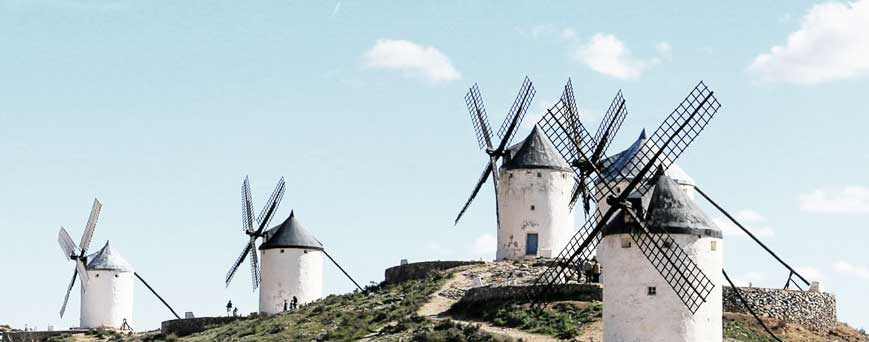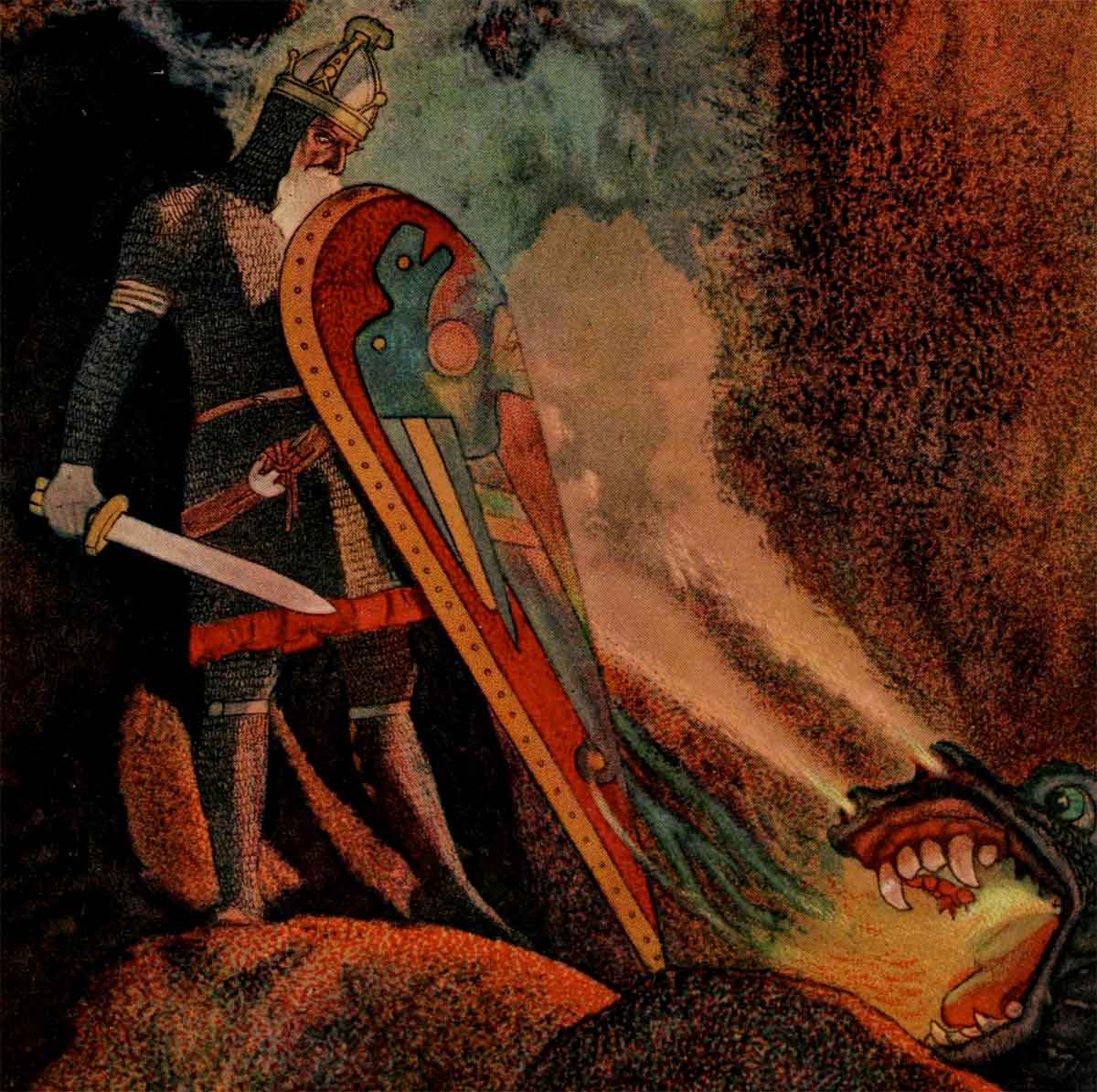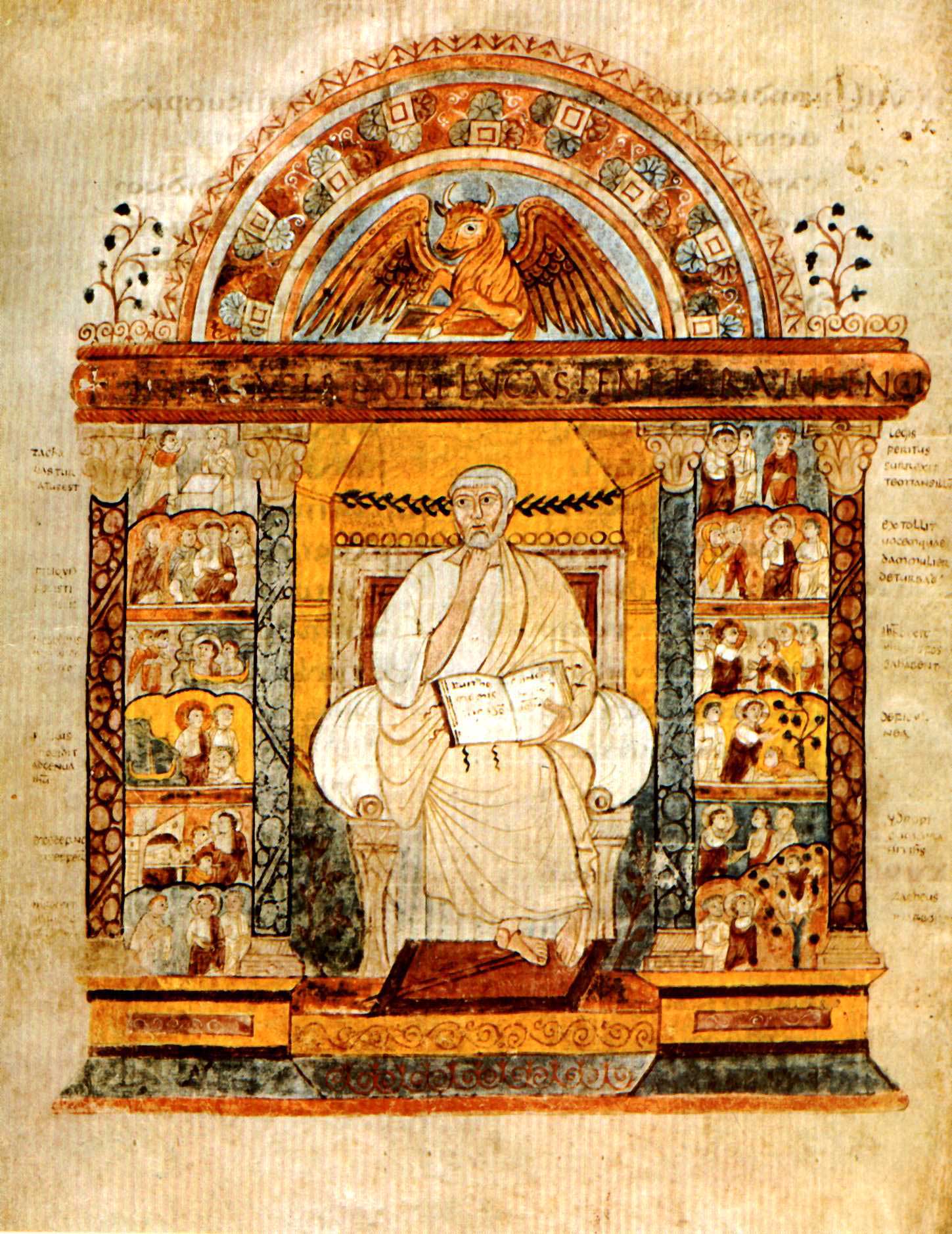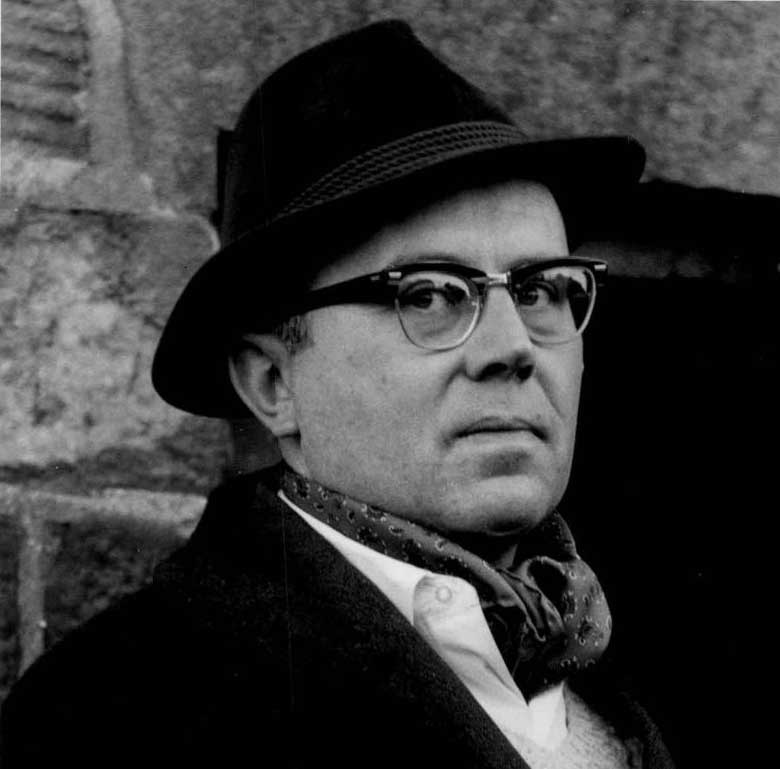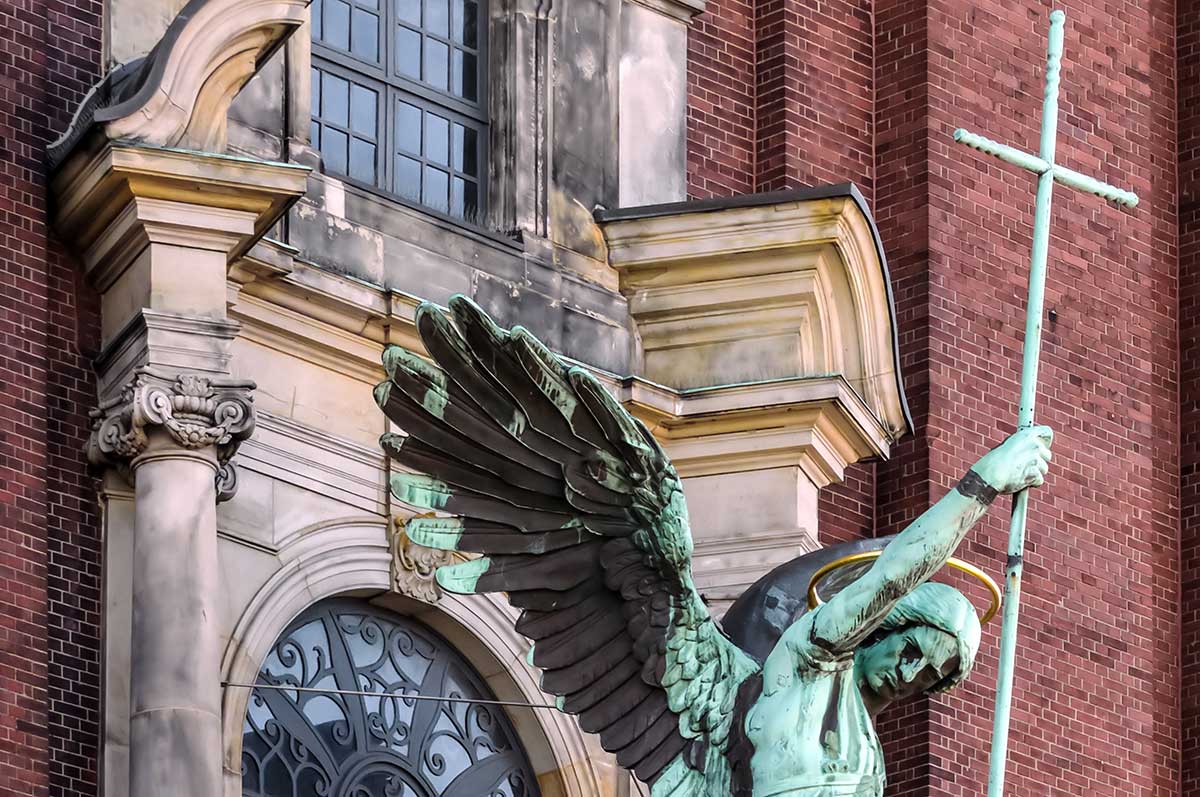Becoming Aeneas, Becoming Paul
Hell & Dante’s Education in Love
by Peter J. Leithart
Contemporary horror films have nothing on Dante. His Inferno is full of terrors that even the most jaded film-maker would shrink from putting on screen: Nightmarish landscapes flowing with streams of boiling blood, deserts of burning sand showered by fire from Heaven, pits and rivers of black pitch, excrement, and muck, a lake eternally frozen that holds Satan, eternally munching on his victims. Noxious smells and putrid fogs fill the air, and as Dante descends toward the center of the earth, light is swallowed in utter blackness.
And this landscape is teeming with people shrieking in despair and pain, so many that Dante says in amazement, “I wondered/ how death could have undone so great a number” (Inferno 3.56–57). The punishments are terrible: Some are upside down in pits, others are enclosed in flames; some have had their heads twisted so that they face backward as they walk, others are tormented by sadistic demons; some are split from chin to belly, their guts and organs hanging between their legs, and others are chased by ferocious dogs that tear off pieces of flesh; some are transformed into serpents again and again, while others are plagued by disease.
Punishments in Hell are often inflicted by other human beings. The place is full of petty squabbles, foolish arguments, infantile fistfights, hair-pulling, head-butting. Near the bottom of the pit of Hell, Dante comes upon Ugolino, who plotted with Archbishop Ruggieri to take over the government of Pisa. When the archbishop turned against him, Ugolino was imprisoned in a tower with his sons and grandsons and left to starve. He watched as his children died “one by one.”
Dante leaves the final act unspoken, but he says enough: “by then gone blind, groped over their dead bodies./ Though they were dead, two days I called their names./ Then hunger proved more powerful than grief ” (Inferno 32.73–76). When Dante finds the count in Hell, he is frozen together with the archbishop and is gnawing on the archbishop’s head:
As a man with hungry teeth tears into bread,
the soul with capping head had sunk his teeth
into the other’s neck, just beneath the skull.Tydeus in his fury did not gnaw
the head of Menalippus with more relish
than this one chewed that head of meat and bones. (Inferno 32.127–132)
Before he can speak to Dante, Ugolino “first wiped off his messy lips/ in the hair remaining on the chewed-up skull” (Inferno 33.1–3).
By comparison with Dante, Stephen King is as tame as A. A. Milne.
Though Dante rivals and surpasses modern horror, his vision of the world of the damned is set in an explicitly Christian context. The violence and terror are not gratuitous or titillating. They are shown because they teach us about God, the God whom Dante confesses as Eternal Love. As he approaches the gate of Hell, Dante reads the famous inscription:
I am the way to the doleful city,
I am the way into eternal grief,
I am the way to a forsaken race.Justice it was that moved my great Creator;
Divine omnipotence created me,
and highest wisdom joined with primal love.Before me nothing but eternal things
were made, and I shall last eternal.
Abandon every hope, all you who enter. (Inferno 3.1–9)
For all its horror, Hell does not only reveal God’s justice and wisdom. It is also a creation of the Father’s power, the Son’s wisdom, and the Spirit’s love.1
To moderns, this sounds preposterous. How could love construct a place where one man eats the brains of another? In this reaction, modern readers are not alone. Dante asks himself similar questions many times during his journey through Hell, and he reacts to the punishments he witnesses with horror and pity.
Unlike moderns, however, Dante believed that if Hell made no sense to him, the flaw must be in him, not in Hell itself, much less in God. If he cannot yet see justice and love at work in Ugolino, it is because he has not learned to see properly. He does not begin with a proper understanding of love; he must undergo an ascent to love, an ascent that requires renewed vision and an ascent that begins with a descent. And this is one of the ways that Hell is a construction of primal love—because it reveals by way of contrast the nature of love.
Exposure & Blindness
Perhaps the most famous encounter in the entire Comedy is with Francesca de Rimini in the circle of the lustful (Canto 5), and Dante’s reaction to her and her story demonstrates how shallow his understanding is as he embarks on his pilgrimage. Francesca is the first character in the Inferno who is allowed to tell her story, and she is the only woman to speak from Hell. Her position at the beginning of the poem emphasizes her importance for the whole Comedy.
Francesca does not name herself directly, but the information given is sufficient to establish her identity. In life, she was daughter of Guido Vecchio de Polenta, lord of Ravenna during the late thirteenth century. Francesca married the deformed Gianciotto de Rimini, son of the lord of Rimini, and her marriage was not for love but was designed to end a feud between the two families. Predictably, Francesca fell in love with her husband’s handsome younger brother, Paolo, and her husband found them together and killed both. When Dante meets Francesca, she is bound together with Paolo for eternity.
The shades in the circle of lust are being blown about eternally by a fierce wind, which is not so much a punishment as an exposure of the true nature of the sin; it shows us what sin looks like once stripped of the illusory beauty that makes it attractive. Punishment, in short, is often inherent in the sin itself, not added to it afterwards. The wind that blows Francesca and Paolo around is a symbol of how, in life, they were driven by changeable passions. This exposure of the true nature of sin is necessary for Dante’s eventual ascent. As he travels through Hell, his vision is being perfected, since he is learning to see without illusion.
No matter how obvious sin becomes, however, those in Hell are incapable of seeing it, and that is part of the hellishness of Hell. Francesca excuses her adultery with the comment that she lingered in a tempting situation with her brother-in-law, but that, of course, is part of the sin itself, not an excuse.
Sinners in Hell are blind to their sin because they are resistant to their punishment. In an unpublished essay on punishment in the Comedy, Michael E. Smith points out that sinners in Purgatory also suffer, and in fact “most of the punishments in Purgatory are of the same kind as the ones in Hell,” since “the same fire that roasts the damned purified the penitents.” The difference is not the punishment, but the acceptance of punishment by the sinner. If the sinners in Hell were moved to Purgatory, they would still not repent, because for them the pains “are nothing but evil. . . . The goodness of God and his punishments is beyond consideration.”2 They are locked forever in a darkness darker than the dark wood. They are incapable of seeing that Hell is a creation of primal love.
Francesca’s blindness is a blindness to the wider consequences of her sin, but these consequences are evident by the company she keeps. Significantly, she comes at the end of a list of other lovers, the first of which is Semiramis, who “was empress over lands of many tongues;/ her vicious tastes had so corrupted her/ she licensed every form of lust with laws/ to cleanse the stain of scandal she had spread” (Inferno 5.54–57). According to one account of her life,
She . . . most shamefully conceived a son, godlessly abandoned him, and then covered her private disgrace by a public crime. For she prescribed that between parents and children no reverence for nature in the conjugal act was to be observed, but that each should be free to do as he pleased.3
To cover the scandal of her own incest, she encouraged others in the same crime.
Lust & Its Consequences
Semiramis sets the tone for the other sinners in this circle, since it emphasizes that there are public consequences for lust. Dante also sees Cleopatra, whose seduction of Mark Antony doomed his hopes to be emperor. There is Helen, “the root of evil woe lasting long years,” and Achilles, whose love for the Trojan princess Polyxena led to his death. Paris, whose lust for Helen started the Trojan war, and Tristan, who loved Isolde even though she was married to King Mark, follow.
As Dante proceeds through this circle, he also sees Dido, the lover of Aeneas, who sacrificed public duty to love. When Francesca appears, she is in “the flock where Dido is” (Inferno 5.85). Francesca’s lust, as much as Dido’s, had public consequences, leading to murder and the breakdown of a family alliance.
The fact that a pathway connects lust and violence is underscored by the connections that Dante draws between the scene with Francesca and the later, gruesome interview with Ugolino. Marguerite Chiarenza points to a number of links between the two stories:
The pilgrim is attracted by the bestial gesture he finds Ugolino engaged in, just as he had been by the light and gentle appearance of the lovers carried together by the wind. He had asked to hear from Francesca her story of love; from Ugolino he asks to hear his story of hate. Francesca, somewhat insincerely, had claimed that to speak of past happy times would cause her pain; Ugolino warns, most convincingly, that recalling the pain will be almost unbearable to him. Like Francesca, Ugolino agrees to speak, not in the name of love as she had done, but in the hope of causing damage to his enemy. Both are bound eternally to the object of their passion. Finally the verbal echoes are strong: “There is no greater pain than to recall (Francesca, 5.121–122); “Thou wilt have me renew desperate grief” (Ugolino, 33.4–5); “I shall tell as one may that weeps in telling (Francesca, 5.126); “thou shalt see me speak and weep together” (Ugolino, 33.9); “the fair form that was taken from me, and the manner offends me still” (Francesca, 5.101–102); “how cruel was my death, thou shalt hear and shalt know if he has offended me” (Ugolino, 33.20–21).4
A story of lust is more attractive than a story of cannibalism, but the literary links show that Dante sees the two stories together. We will not truly understand the nature of Francesca’s sin unless we see that there is an inner connection between it and the sins of Ugolino. We will be making progress in truth and in love when we realize that lust devours.
Training in aesthetic and literary judgment is also an aspect of Dante’s infernal education in love. Francesca and Paolo were tempted to adultery by reading the story of Lancelot and Guenevere, and especially a portion of the story concerning Galleot, who served as an intermediary between the two legendary lovers.5 As Francesca and Paolo read of the “smile” of Guenevere that was kissed by the great lover Lancelot (Inferno 5.133), they were led then to enact the book in reality. The book thus becomes the “Galleot” of their affair, the “pander” between them, the pimp that enables their adultery. Learning to see means learning to judge beauty rightly, to see through a thin veil of beauty to the ugly reality beneath.
That insight comes later, however, and here near the top of the pit of Hell, it is easy to be seduced by appearances. Francesca speaks, after all, about love, and she speaks movingly and poetically. “Amor” (love) begins three stanzas of her speech, and she declares two laws of love, both of which are themes of courtly love.
First, she states the theory that love is an irresistible attraction to the beauty of the other sex: “Love, quick to kindle in the gentle heart,/ seized this one for the beauty of my body” (Inferno 5.100–101). Francesca is not only alluding to the general tradition of courtly love, but specifically to the poetry of Guido Guinizelli, the founder of the Italian “new style,” one of whose canzone affirmed that love takes its residence in “the gentle heart.” Her second “law” of love is equally indebted to the courtly love tradition: “Love, that excuses no one loved from loving,/ seized me so strongly with delight in him,/ that, as you see, he never leaves my side” (Inferno 5.103–105). A beloved woman is as irresistibly drawn to the lover as the lover is to her beauty.
Both laws, it must be noted, attribute omnipotence to love, and at the same time shift blame from the lovers to love itself.6 Following these “laws” of love is disastrous. The final tercet that begins with “amor” speaks of the horrific consequences: “Love led us straight to sudden death together” (Inferno 5.106).
Love & Piety
Dante has not yet learned to discern between true love and false. As he questions Francesca, he accepts her account of the situation: “tell me, in that time of your sweet sighing/ how, and by what signs, did love allow you/ to recognize your dubious desires?” (Inferno 5.118–120). He “joins her in speaking the language of courtly love. It was Love, as she had said, that brought the lovers to ‘one death.’”7
Nor has Dante really understood the nature of pieta, another key term in this episode, which ranges in meaning from “pity” to “piety.” When Dante calls out to Francesca and Paolo, it is with a compassionate cry (Inferno 5.87), and Francesca welcomes the pieta that the pilgrim expresses for her wretchedness (Inferno 5.93). When Dante has heard her story, he weeps with “tristo e pio,” sadness and pity (Inferno 5.117).
Pieta, too, is a major theme of the poem. Beatrice’s love for Dante expresses itself in pity for his desperate condition in the dark wood. When she finally meets him at the top of Mount Purgatory, she rebukes him with bitter, sharp pity (“pietade acerba,” Purgatorio 30.81). The pieta of Beatrice ensures that the pilgrim will make his way to salvation, but this is precisely what the pieta of Francesca does not do. Instead of rousing him to continue the pilgrimage, Dante ends the canto in a swoon.
An association with Aeneas is also in the background. In Canto 2, Dante hesitates to enter Hell, telling Virgil, “I am not Aeneas, I am not Paul” (Inferno 2.32). The reference to Aeneas is an allusion to that hero’s journey to the underworld in the Aeneid, Book 6, and the Pauline reference is to his ascension to the third Heaven (2 Cor. 12:2). Dante believes he is unqualified to make the journey to Hell and Heaven, being neither Aeneas nor Paul.
Though the word pieta does not appear here, Dante is well aware that Aeneas’s great heroic virtue is his piety (Latin, pietas), manifested in his willingness to shoulder responsibilities, act out of loyalty to his family and city, and submit to the will of the gods. Piety in this sense is echoing in the context, especially since Francesca is a member of “Dido’s flock.” The pieta that Francesca rouses, however, is not loyalty to family and duty and submission to God, but the opposite. Her story of un-pietas arouses Dante’s pieta.
All of this is to say that the pilgrim has only just begun his pilgrimage, and has a long way to go before he reaches maturity. He has yet to see sin for what it is. Truly, he is not Aeneas, for he does not know the meaning of pietas. Or, he is like the Aeneas of the early books of the Aeneid, distracted from his goal and destination by “one of Dido’s flock.” Nor is he Paul, for he is not yet capable of discriminating true love, true charity, from the carnal amor of Francesca.
Readers of the Comedy have always been attracted to Francesca. Dante meant us to be. But he also meant for us to learn that this attraction is a symptom of our blindness. If we find her attractive, it is because we are still wandering in the dark wood, having lost the path of truth. If we pity her, it is because we have not learned the meaning of true pieta. If we think that her love was genuine love, we have not learned the true nature of charity, a lesson that only Hell can teach. With Dante, each reader has to confess, “I am not Aeneas; I am not Paul.”
Radiant Living Light
The final response to Francesca’s seductive but ultimately hellish love comes only with Dante’s entry into Paradise. Though concerned with the completion of his training in love and piety, Paradiso begins with another motif from Dante’s symphony.
Virtually the first word of Paradiso is “glory,” and this announces the theme of the whole canticle. The opening line speaks of the “glory of the One Who moves all things,” the glory of the Creator and Ruler of the universe (Paradiso 1.1). But the original glory of God is not the sole focus of Dante’s attention. This divine glory, he claims, “penetrates all the universe, reflecting/ in one part more and in another less” (Paradiso 1.2–3). The glory of the Creator is manifested in every cranny of his creation, though not always to the same degree. Slugs and salamanders are glorious, but not so glorious as men or mountains.
Employing the image of light, Thomas Aquinas, the greatest of the medieval theologians Dante encounters in Paradise, later explains more fully this view of created glory. Everything “which dies and all that cannot die/ reflect[s] the radiance of that Idea which God the Father through His love begets” (Paradiso 13.52–54). By “Idea” Aquinas means the eternal Son of God, the Second Person of the Trinity, who became flesh in Jesus. He is the “Idea” of the Father, as he is the Father’s Word, because in him all the Father’s mind is expressed.
Aquinas also calls the Son the “Living Light,” who “streams forth” from the Father. The Father is the “radiant Source” of the Light that is the Son, but the Light “never parts” from the “Source” that is the Father, nor from “the Love which tri-unites with them,” that is, the Holy Spirit (Paradiso 13.55–57). The Father begets the Light of the Son through his love, and the Three Persons are united in the Love that is the Spirit.
Radiant light and glory from the Son is a product of the Father’s love for him, and of the Spirit’s loving work. Love and glory are thus closely linked in Dante’s mind; though there can be glitz and glamour aplenty, without love there is no true glory. The glory that permeates the universe is specifically the glory of the Triune God, the God who is love. Dante will become a Paul only when he realizes that true love has its source there, in the communion of Father, Son, and Spirit. Here is the fundamental reason why Francesca’s amor is perverse: It has separated a form of “love” from the light and glory of God.
Dante now also learns another basic flaw in Francesca, having to do with how the love of the Triune Persons organizes the creation. Expanding on the insight that the glory of God is distributed through the creation, Aquinas says that all created things reflect the “radiance” of the Son because the “Living Light” that is the Son “of Its own grace sends down its rays, as if/ reflected, through the nine subsistencies/ remaining sempiternally Itself” (Paradiso 13.58–60). (The nine subsistencies may refer to the nine spheres of Paradise or to the nine orders of angels, but it does not really matter which.)
Degrees of Glory
The Light of the Son becomes diffused as it moves from the higher reaches of the universe to the lower. Like light penetrating water, it becomes dimmer at the lower end. Aquinas changes the picture to wax to explain further:
The wax of things like these
is more or less receptive, and the power
that shapes it, more or less effective—stamped
with the idea, it shines accordingly.So trees of the same species may produce
dissimilar fruit, some better and some worse;
so men are born with diverse natural gifts.And if the wax were perfectly disposed,
and if the Heavens were at their highest power,
the brilliance of the seal would shine forth full;but Nature never can transmit this light
in its full force—much like the artisan
who knows his craft but has a trembling hand. (Paradiso 13.66–78)
Aquinas gives two reasons why the natural world cannot manifest the complete radiance of God. The first has to do with the quality of the “wax” or the matter that is being formed to reflect the glory of the Son. Just as wax receives the imprint from a stamp, so the creation receives its “radiance” from the “imprint” of the Son’s Light. But some wax is thicker and tougher to work, and in the same way it is harder to stamp the Son’s glory on certain kinds of material. Dirt is harder to make luminous than the rainbow, or the emerald eyes of Beatrice.
Second, the light from the Heavens does not shine on the “wax” of creation with its full intensity. Earth cannot manifest that glory fully because the Son’s glory is too “far away,” and in Aquinas’s Neoplatonic universe, his Light has to pass through too many layers before it reaches earth. As Paul says, the glory of heaven differs from the glory of earth, and “there is one glory of the sun, and another glory of the moon, and another glory of the stars; for star differs from star in glory” (1 Cor. 15:41).
Aquinas is also explaining why creation is diverse, why there are so many different kinds of things and why they differ so much in quality. Different parts of creation reflect the Light of the Son in different degrees. Though its parts display different degrees of glory, all the diverse things of creation are ordered into a brilliant display of beauty and light. The glory that Dante speaks of in the first line of Paradiso is the glory of the “One Who moves all things.” Just as each thing reflects its particular degree of the Light of the Son, so also everything moves toward the place that is appropriate to its degree of glory.
In Paradise, the order of glory and light is not an immobile order, like the order of Hell. Heavenly order is an order of coordinated movement, in which things that differ in glory are harmonized like notes of music or partners in a dance.
In particular, man is created to take a particular place in the dance of the heavens, as Beatrice shows in her answer to Dante’s question about “how I can rise through these light bodies here” (Paradiso 1.99). Beatrice explains that the order of all things “gives the form that makes the universe resemble God” (Paradiso 1.104–105). Rocks, which reflect God in a lesser degree than a man, are made to be at a great distance from the Source of Light.
Man’s sin may lead him down, so that he ends up no better than a rock, far from the Light. Being endowed with intellect and the capacity for love, however, man is made to go up. He is designed for a place in Paradise, made to ascend, created to take his place in the dance.
The Dance of Love
The glory that shines forth from the Son draws out man’s love. At the end of Canto 4, Beatrice’s eyes are shining with such great love and light that Dante is about to faint, and as Canto 5 begins, she explains how she can be so transparent to the Light of God:
If, in the warmth of love, you see me glow
with light the world below has never seen,
stunning the power of your mortal sight,you should not be amazed, for it proceeds
from perfect vision which, the more it sees,
the more it moves to reach the good perceived.I can see how into your mind already
there shines Eternal Light which, of Itself,
once it is seen, forever kindles love;and should some other things seduce man’s love,
It can be only some trace of this Light,
misapprehended, shining through that thing. (Paradiso 5.1–12)
This important passage shows the connections between several of the key themes of Paradiso and of the Comedy as a whole. God is the “Eternal Light” that shines in all creation, but only those who have “perfect vision” can see this Light in its true brightness. Seeing the Light and glory of God “kindles love,” and love makes the lover mobile, so that he moves toward the Light, the good that is seen.
This explains why Dante considers it so important to see things rightly. Creation has the capacity to “seduce” because it is filled with the Light of the Son. If one’s vision is false, he will be drawn to love something that is not the true Light, but only a dim mirror of the true Light. He will worship and serve the creature rather than the Creator. Having seen and loved falsely, he will be moved to act in a way that draws him toward the false light. Dante is ready for these insights by the time he gets to Paradise because he has been trained to find false light repulsive rather than attractive.
It is apparent, then, that the celestial dance is not only a harmony of persons with different degrees of glory, but also an expression of love. Rivalry and competitiveness have no place in a dance. Each partner must yield to the other, seeking not to display his own skill but the combined skill of the dancers. The dance of glory is thus also a dance of love, which, like the dance of glory, finds its highest expression in the Trinity, the eternal dance of Father, Son, and Spirit, and the perfectly harmonized dance of God and man in the Incarnate Son.
This doctrine of love is expressed in a less abstract manner by Piccarda, whom Dante meets in the sphere of the moon and who structurally matches and answers Francesca. Unlike Francesca’s “love,” which led her to overreach her bounds, Piccarda speaks of a love that “tempers our will and makes us want no more/ than what we have—we thirst for this alone” (Paradiso 3.70–72). Love is evident when a human will delights in the divine will. As she says, in one of the most beautiful lines of the poem, “In His will is our peace” (Paradiso 3.85). In Piccarda, love and piety have kissed each other. In Piccarda, love means accepting one’s assigned place in the dance of glory.
Dante’s final vision of harmonious divine love is the goal of the whole Comedy, but Dante cannot reach this end by a direct route, just as he cannot climb the hill from the dark wood toward the rising sun. Following Augustine’s dictum, he must “descend in order to ascend,” descend into the abyss where Love exposes the folly and horror of sin, including Dante’s own sin, before he can begin to see the glory of Triune love. Because its terrors shape a wayward pilgrim into an Aeneas and into a Paul, Dante’s doctrine of Hell is vindicated: It is indeed formed not only by “Justice” and “Divine omnipotence,” but by “highest wisdom joined with primal love.”
Notes:
1. Charles Singleton, Inferno: Commentary (Princeton: Princeton University Press, 1989), p. 40.
2. Michael E. Smith, “Punishment in the Divine Comedy” (unpublished, 1994), pp. 50, 58, 66.
3. Quoted in Singleton, Inferno: Commentary, p. 78. This comes from Paulus Orosius, whom Singleton calls “one of Dante’s chief historical sources.”
4. Marguerite Mills Chiarenza, The Divine Comedy: Tracing God’s Art (Boston: Twayne Publishers, 1989), p. 49.
5. Boccaccio called the Decameron a “Galleot,” after this intermediary between Lancelot and Guenevere.
6. Singleton, Inferno: Commentary, pp. 89–90.
7. Ibid., p. 92.
This article is an excerpt from Ascent to Love: A Guide to Dante’s Divine Comedy (Canon, 2001). The quoted passages are taken mainly from Mark Musa’s translation of the Divine Comedy.
Peter J. Leithart is an ordained minister in the Presbyterian Church in America and the president of Trinity House Institute for Biblical, Liturgical & Cultural Studies in Birmingham, Alabama. His many books include Defending Constantine (InterVarsity), Between Babel and Beast (Cascade), and, most recently, Gratitude: An Intellectual History (Baylor University Press). His weblog can be found at www.leithart.com. He is a contributing editor of Touchstone.
subscription options
Order
Print/Online Subscription

Get six issues (one year) of Touchstone PLUS full online access including pdf downloads for only $39.95. That's only $3.34 per month!
Order
Online Only
Subscription

Get a one-year full-access subscription to the Touchstone online archives for only $19.95. That's only $1.66 per month!
bulk subscriptions
Order Touchstone subscriptions in bulk and save $10 per sub! Each subscription includes 6 issues of Touchstone plus full online access to touchstonemag.com—including archives, videos, and pdf downloads of recent issues for only $29.95 each! Great for churches or study groups.
Transactions will be processed on a secure server.
more on literature from the online archives
more from the online archives
calling all readers
Please Donate
"There are magazines worth reading but few worth saving . . . Touchstone is just such a magazine."
—Alice von Hildebrand
"Here we do not concede one square millimeter of territory to falsehood, folly, contemporary sentimentality, or fashion. We speak the truth, and let God be our judge. . . . Touchstone is the one committedly Christian conservative journal."
—Anthony Esolen, Touchstone senior editor





